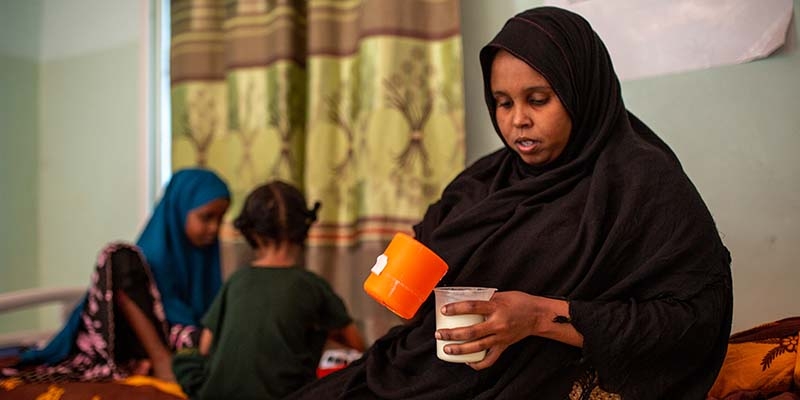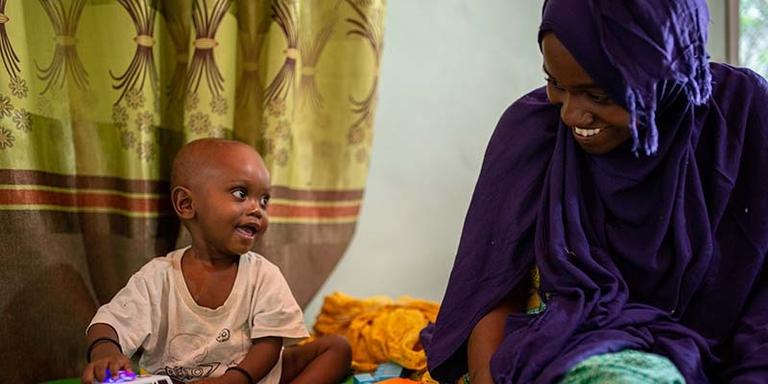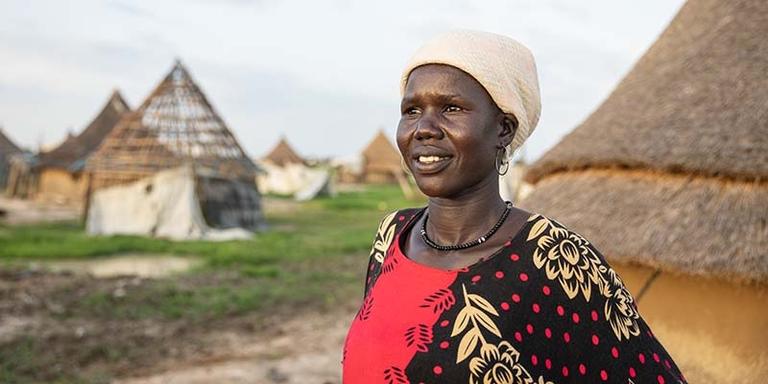
Ubah*, four, with mum Yasmiin*, 28, at a stabilization center run by Save the Children in Puntland, Somalia. Photo Credit: Mustafa Saeed/Save the Children
Children on the Brink: The Global Hunger Crisis
Written by Greg Ramm, Head of the Department of Humanitarian Response at Save the Children US
I recently traveled to Burkina Faso to visit a local clinic where Save the Children and Doctors of the World are treating children with severe acute malnutrition. I have seen centers like these before but it’s always shocking to see such desperate conditions.
Even though the clinic had around 20 infants in its care, the place was eerily quiet. These children were using what little energy they had to simple stay alive.
Scenes like these have become all too familiar in many parts of the world. The combined impact of conflict, climate change, COVID-19, and soaring food prices from the conflict in Ukraine is behind the worst hunger crisis in decades.
A perfect storm of shocks has left up to 1 million people facing near-famine conditions. As I write this, it’s estimated that one person is dying of hunger every four seconds around the world.
But what’s happening is entirely preventable. We don’t need to spend billions on researching a cure or developing a vaccine. Save the Children knows how to treat malnutrition and we know how to respond to this crisis.

Abshir*, nine months, with mother Hamdi*, 19, being treated for severe acute malnutrition at a hospital in Somalia. Photo Credit: Save the Children
Treating Malnutrition in Somalia
In Somalia, we’re treating malnutrition and working with caregivers to identify malnourished children before it becomes life-threatening.
These services help children like Abshir*, nine months, who was taken to a local Save the Children-supported hospital where he was treated for severe acute malnutrition. For Abshir and many other children, the cure for severe acute malnutrition is simple: special milk formula and high-nutrient peanut paste. Within hours of taking this treatment, a child struggling with malnutrition starts to feel better.
“He was unable to stand but now he can stand upright”, Abshir’s mother explains, “When I see my child smiling and eating something, I become excited.”
After spending a week at the hospital, Abshir* returned home to be reunited with his family.

Aker*, 36, received help from one of our cash distribution centers in Akobo West, South Sudan. Photo Credit: Esther Mbabazi/Save the Children
Providing Cash Assistance in South Sudan
During this crisis, our cash assistance programs help families buy food and other essentials most relevant to their unique needs.
In South Sudan, we met Aker* at a cash distribution center in a town where conflict, climate change, and rising rates of hunger have gripped the community. Fortunately, we were able to provide her and other families with cash assistance to help them buy food and take control of their future.
“The money is of great help to me,” Aker shared. “I have used some of it to rebuild my house which was destroyed by flooding.”
We know from years of experience that cash assistance is the fastest and most efficient way to help people during a crisis.
What You Can Do for Children
I have seen the incredible impact we can have when the world rallies to support children in crisis. We did it for children in Ukraine earlier this year, and in the Horn of Africa in 2017 when famine was averted. Sadly, we have also seen the impact when we don’t act or delay. In 2011, Somalia experienced a devastating famine that killed over a quarter of a million people – half of them children under the age of five.
We must not let history repeat itself. Millions of children can be saved through our efforts and through the commitment of people like you.
Learn how you can join our efforts in responding to the global hunger crisis>>
*Names changed to protect privacy
Greg Ramm is the Head of the Department of Humanitarian Response at Save the Children US, and has worked for Save the Children for over 20 years. Most of Greg's time with Save the Children has been in Africa, initially as Country Director in the Democratic Republic of Congo and then in Ghana. Greg also served as Head of Regional Office for Southern Africa, as Regional Director for West and Central Africa, based in Dakar, Senegal and as Deputy Director of Global Programmes, based in London.
